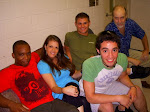Producing an independent film is hard and nothing is harder or more important than the casting process. Although I’ve hired a casting agency and/or casting director for about 80% of my films, I’ve always casted all of my productions based on my own instinct and criteria despite listening to the advice of my casting director.
Having participated in the process of casting on several productions I’ve devised a list of elements that I look for in a potential actor for any of my productions. Although there are multiple elements that any actor can do to sway my favor in their direction, these are the five basic elements that I use to cast each of my individual actors. These elements are imperative to casting an independent film production but can be used to cast any type of film at any budget.
ELEMENT #1: “Check their resume and previous experience.”
One of the first things an actor will hand you (or your casting director) will be their head shot and resume, which will list all of the actor’s previous experience, training, and productions (be it film, theatre, professional, community, print, or commercial, etc.). This will help you decide if the actor has the training and prior experience to take on the role that they are auditioning for. It will also contain contact info for other production companies and agents so that you can contact references for the actor.
A thorough resume can be the deciding factor between two potential actors that are equally qualified in all other areas.
ELEMENT #2: “The cold reading verses the monologue.”
The audition is the number one way in which actors are cast not only in films but theatre, video, corporate, and commercial productions. There are two types of ways to audition – the cold reading (in which actors are given sides of scenes from the production on the day of the audition with little or no time to prepare) and the monologue (which is a prepared scene reading from the actor’s own choice of material). More often than not actors will be given sides for a cold reading but I prefer to see and hear an actor perform their own monologue. Cold readings have their benefits. From a cold reading I can tell if an actor can take direction from a director, whether they will be able to incorporate changes in the script on the day of filming, and will they be able to improv at a moment’s notice, among other things.
From a prepared monologue I can tell whether or not the actor will come prepared to set with lines memorized, whether or not they will bring passion to the role, and whether or not they will be an actor who uses their body and movement to help tell a compelling story, among other things. These are the criteria I look for in an actor while casting a film.
For my feature House of Secrets (produced by BLH Films) I cast one of my leads – Chris Whitley (Paperboys) based on his monologue. He gave a great cold reading but so did three other actors but it was his monologue (which the others did not have) that broke the three way tie. In fact, I ended up calling him that evening and telling him the part was his.
ELEMENT #3: “An actor must be able to improve.”
Because the screenplay is only seen and viewed as a “blueprint” for the final film product, actors must be able to incorporate changes while on location filming and sometimes even in the post-production process. Being trained in the art of improvisation is not something to take lightly. It is one of the many skills that an actor uses to not only help them find and create their character but to also interact and react to other actors. It is used to perfection in sketch comedy (i.e. Monty Python and Saturday Night Live) but is also an invaluable tool when changes are made to the screenplay on set during filming. Actors who posses this skill are more likely to be able to incorporate these types of changes without too many problems.
Director Ron McLellen (Jack O’Lantern) is very prone to script changes when on set and is someone who uses improv all the time to make scenes “pop” off the page. On the set of his Evil in the Flesh, McLellen was forced to improv much of the climax of the film when the lead actress injured herself (thankfully, not while filming or on set) and was unable to do many of the stunts originally required of her. The focus of the end of the film shifted from the lead actress to another actor and all the actors had to have the ability to improv the new changes to the film. Luckily, the two actors whom the changes affected the most had training in improv and/or performed with an improv troop. Because the director knew he might improv during filming these actors were given a leg up when we cast them and it ended up working for the production in the end.
ELEMENT #4: “Be aware of scheduling conflicts.”
One of the biggest problems I’ve encountered on an independent film production is the conflicts that are faced with the production schedule in terms of actors’ availability. Many of the films I’ve worked on have had their production schedule stretched two, three, or five weeks due to actor unavailability (I’ve even been on some where filming stretched more than a year). It is imperative that the shooting/production schedule be set prior to auditions and that all potential cast members are well aware of when filming will be. The last thing any producer wants to do is retrofit a new shooting schedule due to the conflicts of multiple cast members. Many future problems can be avoided if this is first addressed at the start of the production.
Production on the indie feature Out of Season (of which I star in and do cinematography) had to be postponed for six months due to the lead actress’ schedule. We were several days into filming when he encountered actor conflicts with the schedule. Principal photography was halted but ultimately when production began again the actress was replaced and everything that had already been filmed had to be scrapped. This is one situation that could have been avoided if production had gotten the actress’ conflicts prior to filming.
ELEMENT #5: “The actor should have enthusiasm.”
This is the hardest criteria to judge because most actors when auditioning for a role do not have the luxury of having read the entire screenplay prior to the audition. On most occasions the actor has only read the synopsis of the screenplay and/or a few sides of the screenplay, in addition to possibly a character breakdown of the role(s) they are auditioning for.
You won’t know from an audition whether or not an actor will love your screenplay or character, but what you will know is whether or not an actor is enthusiastic about their craft and the possibility of getting a role in your film. If you can find an actor who is enthusiastic just from reading a synopsis and sides of your screenplay then that’s half the battle.
In reference to House of Secrets, again, actor Whitley (who performed the monologue) was so enthusiastic during both his cold reading and the monologue that I immediately took notice. He was an actor that I was not familiar with prior to his casting and he had twice more energy than any of the other actors that came in to read. The same can be said for actress Alicia Schulz (another actor I was not familiar with prior to casting) who exhibited so much more enthusiasm than any of the other actors that came in that she was immediately put at the top of my list (and who eventually was rewarded with the role).
There are a lot of criteria that must be taken into consideration when casting for a film and none of it should be taken lightly because the people you cast will be with you throughout production of the film (and if you’re lucky on subsequent films as well), so, remember to never take the casting process lightly and always consider the suggestions and recommendations of not only the casting directors and agencies as well as producers, writers, directors, and all other important personnel in order to craft a final product that everyone involved can be proud of.
Saturday, April 17, 2010
5 Elements to Look For in an Actor When Casting Your Independent Film
Labels:
actors,
Alicia Schulz,
audition,
casting,
Chris Whitley,
Film,
head shot,
headshot,
monologue,
resume,
Ron McLellen,
theatre
Subscribe to:
Post Comments (Atom)






No comments:
Post a Comment